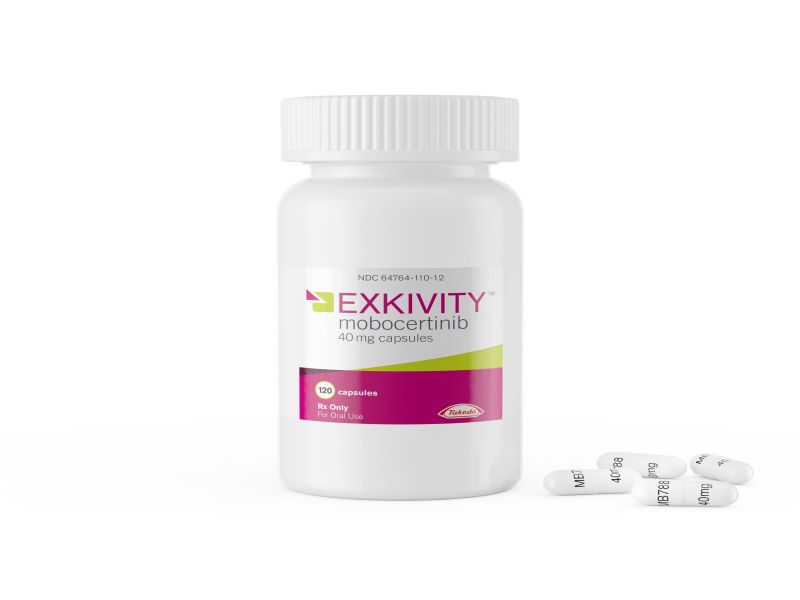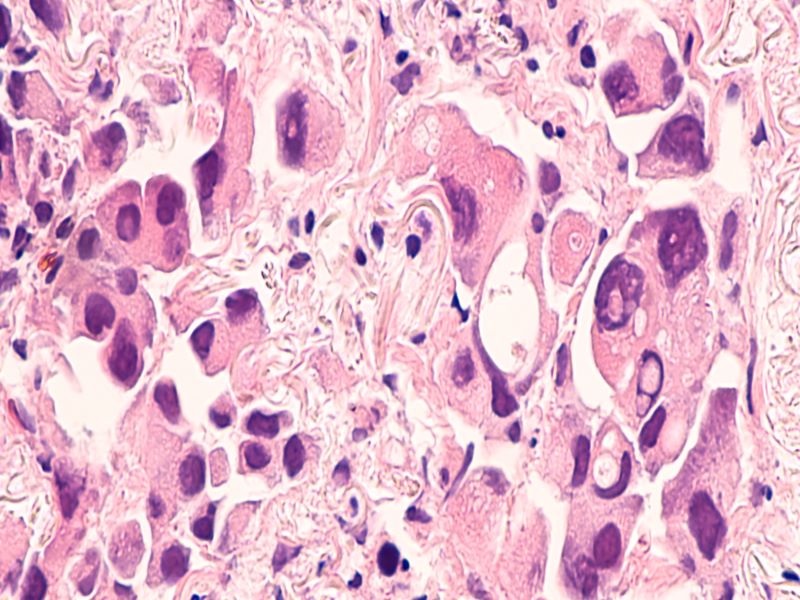Exkivity™ (mobocertinib) is a first-in-class oral kinase inhibitor indicated for the treatment of locally advanced or metastatic non-small cell lung cancer (NSCLC) with epidermal growth factor receptor (EGFR) exon 20 insertion mutations in adult patients, whose disease has progressed during or after platinum-based chemotherapy.
Developed by Japanese pharmaceutical company Takeda Pharmaceutical, Exkivity is available as white capsules in 40mg dosage strength. Its recommended dosage is 160mg once daily with or without food.
Regulatory approvals for Exkivity
The US Food and Drug Administration (FDA) granted orphan drug designation to Exkivity in 2019 for the treatment of lung cancer with human epidermal growth factor receptor 2 (HER2) mutations or EGFR mutations, including exon 20 insertion mutations.
In April 2020, Exkivity secured breakthrough therapy designation from the FDA for metastatic NSCLC patients with EGFR exon 20 insertion mutations, whose disease had progressed on or after platinum-based chemotherapy.
In October 2020, the drug received breakthrough therapy designation from the Chinese Centre for Drug Evaluation (CDE) for locally advanced or metastatic NSCLC (mNSCLC) patients with EGFR exon 20 insertion mutations who had previously undergone at least one prior systemic chemotherapy.
In April 2021, the FDA granted priority review to Takeda’s new drug application (NDA) for mobocertinib (TAK-788) to treat mNSCLC patients with EGFR exon 20 insertions, who had previously experienced platinum-based chemotherapy.
In July 2021, the CDE accepted the company’s NDA for Exkivity as a treatment for adult patients with EGFR exon 20 insertion+ mNSCLC.
In September 2021, the FDA granted accelerated approval to Exkivity (mobocertinib) and approved Thermo Fisher Scientific’s Oncomine Dx Target Test as a next-generation sequencing (NGS) companion diagnostic test with Exkivity for the identification of patients with EGFR exon 20 insertion mutations.
NSCLC causes and symptoms
NSCLC is the most common form of lung cancer, representing around 85% of the estimated 2.2 million lung cancer cases diagnosed a year worldwide, according to the World Health Organisation (WHO).
EGFR is a receptor tyrosine kinase vital for the regulation of cell growth and division. Its mutations cause uncontrolled cell growth and division, promoting tumours. EGFR mutations are the most common mutations in NSCLC.
EGFR exon 20 insertion mutations are the third most prevalent primary EGFR mutation, harboured by around 2% of NSCLC patients. NSCLC patients with these mutations tend to have a worse prognosis than patients with tumours driven by other EGFR mutations.
Some of the most common symptoms of NSCLC include the worsening of chronic cough, cough producing blood, wheezing, unexplained weight loss, chest pain or painful breathing, decreased appetite, and lung infections such as bronchitis and pneumonia.
Advanced stage symptoms include bone pain, headaches or seizures due to brain metastases, and lumps in lymph nodes.
Mobocertinib’s mechanism of action
Mobocertinib is a potent, small-molecule tyrosine kinase inhibitor (TKI) specifically designed to selectively target and bind to EGFR exon 20 insertion mutations and inhibit it at lower concentrations than wild type EGFR.
Clinical trials on Exkivity
The FDA’s accelerated approval of Exkivity was based on results from Study 101, an international, non-randomised, open-label, multicohort, Phase I/II clinical trial. The study enrolled 114 patients with EGFR exon 20 insertion+ NSCLC, who had previously been treated with platinum-based chemotherapy.
The trial’s main efficacy outcome measures were overall response rate (ORR), as assessed by a blinded independent central review (BICR) according to version 1.1 of the Response Evaluation Criteria in Solid Tumours (RECIST) specification, and response duration.
Exkivity showed a confirmed ORR of 28% for each independent review committee assessment, while the median duration of response (DoR) was 17.5 months. Median overall survival of 24 months and median progression-free survival of 7.3 months were achieved. Around 59% of patients treated with Exkivity achieved a DoR of more than six months.
The most common adverse events reported among patients treated with Exkivity during the trial included diarrhoea, rash, nausea, stomatitis, vomiting, decreased appetite, paronychia, fatigue, dry skin and musculoskeletal pain.





